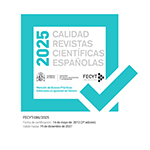The Oriental Horizon of Portuguese Merchants in Rome (1590-1655)
Abstract
Through the presentation of certain objects which appear in inventories in Rome in the sixteenth and seventeenth centuries and the trajectories of certain Portuguese merchants present in the city in the same period the article considers Portuguese merchants as cultural intermediaries. Through their real or perceived links to the Iberian world and its far-flung territories and their ties to the bureaucracy of the Roman Catholic Church or links to the world of the Roman Curia these individuals were the agents to have objects of a perceived oriental provenance reach the city. The article also considers how problematic and ambiguous the designation of orient is and how its manifold meanings at the time must be taken into consideration when attempting to understand when the term was attributed to objects.
Downloads
Article download
License
In order to support the global exchange of knowledge, the journal Cuadernos de Historia Moderna is allowing unrestricted access to its content as from its publication in this electronic edition, and as such it is an open-access journal. The originals published in this journal are the property of the Complutense University of Madrid and any reproduction thereof in full or in part must cite the source. All content is distributed under a Creative Commons Attribution 4.0 use and distribution licence (CC BY 4.0). This circumstance must be expressly stated in these terms where necessary. You can view the summary and the complete legal text of the licence.












